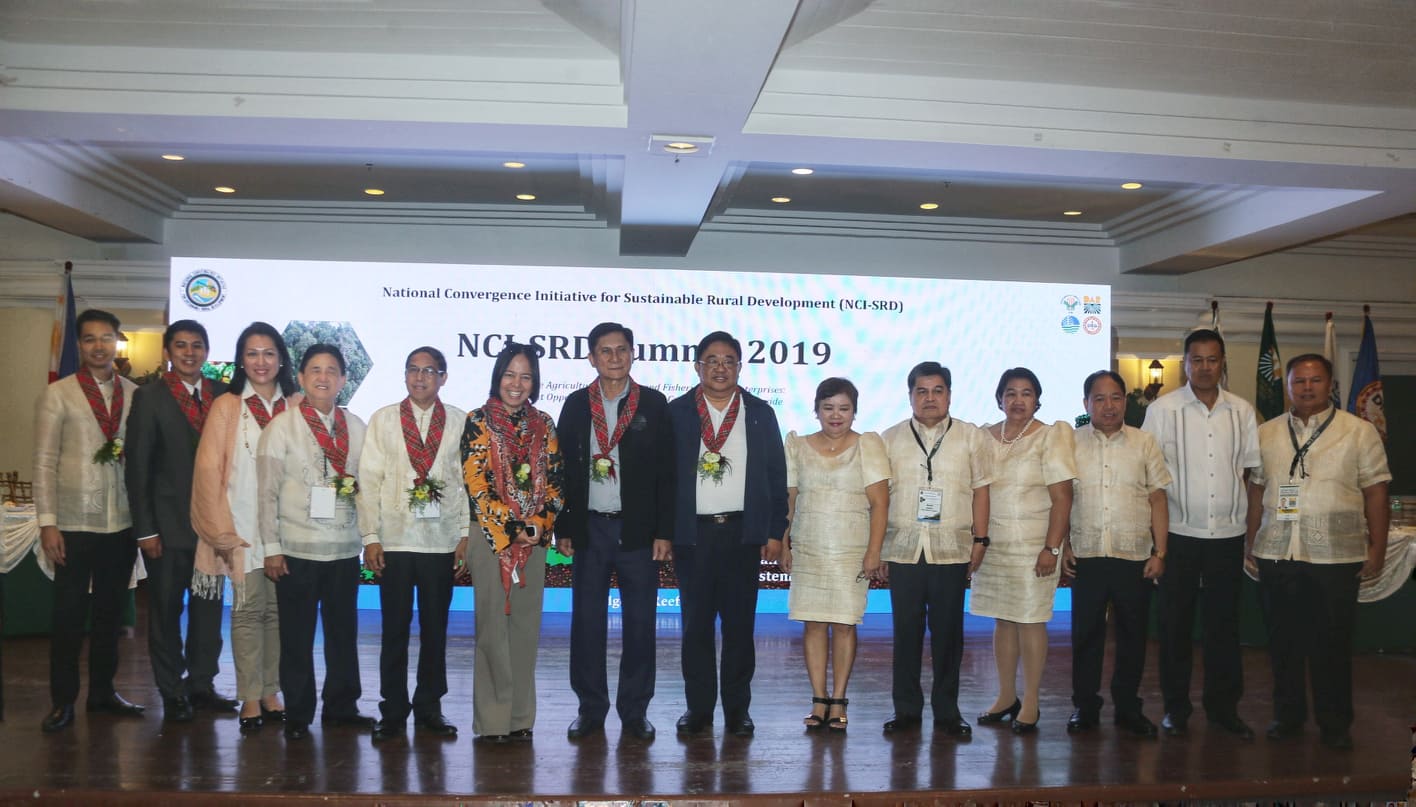
Convergence works.
Four national government agencies proved working together gets results as they united to renew commitment to the National Convergence Initiative for Sustainable Rural Development (NCI-SRD) on July 24, 2019 in Iloilo City.
The Departments of Agriculture (DA), Agrarian Reform (DAR), Environment and Natural Resources (DENR), and the Interior and Local Government (DILG) marked NCI’s 20th year through the signing of the Revised Joint Administrative Order (JAO) No. 01, Series of 2019.
Entitled Strengthening the Implementation Framework for the DA-DAR-DENR-DILG NCI-SRD, the revised JAO aims at aligning the implementation framework with the Philippine Development Plan (PDP) 2017–2022 and the NCI-SRD Roadmap 2018–2030. It also underscores the ridge-to-reef approach or strategy, which sets the NCI-SRD apart from other convergence initiatives of the government.
DENR Secretary Roy Cimatu, DAR Secretary John Castriciones, DA OIC-Secretary Waldo Carpio, and DILG Western Visayas OIC-Regional Director Ariel Iglesia led the event that gathered about 400 participants from the four departments, local government units, and the private sector.
During the event, each agency shared accomplishments and key initiatives for moving forward and facing new challenges in rural development, particularly in the agriculture, forestry, and fisheries (AFF) sector.
DA-Bureau of Soils and Water Management Director Angel Enriquez, on behalf of OIC-Secretary Carpio, declared that the DA is up for the challenge. She said, “In this era of change and transformations, we must be ready to take on more challenges and confront new frontiers and requirements for rural development.”
With the NCI-SRD 2019 Summit’s theme, “Sustainable AFF-Enterprise Investment Opportunities for Inclusive Growth in the Countryside,” discussions centered on the ridge-to-reef approach, AFF sector interventions, and the need for concerted effort of government agencies and the private sector.
Development for all generations
Director Iglesia said that the ridge-to-reef or the integrated environmental management approach is important “to achieve a better future for all of us without sacrificing the future of our children and their children’s children.”
“We can’t turn a blind eye like what happened in Boracay and Manila Bay,” he added.
Citing the Boracay rehabilitation as a successful convergence effort, Secretary Cimatu stressed that both convergence and political will are necessary to deliver such big project.
“Convergence plus political will equals Boracay,” he said.
While Cimatu stated that the DENR is fully committed to the NCI and the development effort in rural areas, he vowed that the department will also concentrate on the environmental problems in urban centers, particularly Manila.
Currently, the DENR leads 13 government agencies in the Manila Bay rehabilitaion project.
According to Cimatu, a clean body of water reflects good governance. Thus, he also vowed to clean all rivers and esteros in the country.
For DAR Secretary Castriciones, the NCI-SRD is a big opportunity to leave a legacy that will truly benefit the farmers and fisherfolk, and he requested everyone to exert more effort in the convergence initiative.
“I am very pleased that this project is ongoing. This is the way for us to uplift the lives of the farmers, fisherfolk, and the workers involved in the agri sector,” he said.
Chairperson for Senate Committees on Agriculture and Food, Agrarian Reform, and Environment and Natural Resources Senator Cynthia Villar also expressed her support to the NCI-SRD. Speaking on her behalf, Atty. Rhaegee Tamaña said that the senator is “confident that the collaboration of agencies will effect positive change in the lives of the people.”
Senator Villar assured the summit participants that she will pursue legislation in support of the NCI-SRD, specifically its institutionalization through the National Convergence Initiative Act.
Strengthening collaborations
“The concerted effort of agencies is crucial,” Atty. Tamaña said. “Let’s continue to work in covergence to help the poor people and lift them from poverty,” she added.
Tamaña stressed that farmers, fisherfolk, and workers in the AFF sector should be encouraged to become agri-entrepreneurs for them to market their own produce.
“The strategy is to train the farmers and enhance their technical expertise and financial literacy,” she said.
Castriciones reiterated President Rodrigo Duterte’s directive for a “whole-of-government approach” in poverty reduction and streamlining the delivery of services.
He suggested that to improve the NCI, other national agencies and financial institutions must be involved. He also supported the institutionalization of the NCI.
For Cimatu, the barangay local government units also play a crucial role for the success of government projects because they are at the frontline.
During the summit, Iloilo City Vice Mayor Jeffrey Ganzon and Iloilo Governor Arthur Defensor, Jr., through his Executive Assistant Maria Fajardo, expressed their commitment to partner with concerned insitutions to improve the AFF sector.
Director Iglesia underscored, “Sama-sama at tulong-tulong tayong lahat, magagawa natin ito.”
The NCI-SRD Summit is conducted every two years to promote inclusive, holistic, and sustainable countryside development and the ridge-to-reef approach as an effective and efficient governance strategy as espoused in the PDP 2017–2022. ### (Gumamela Celes Bejarin, DA-AFID)













